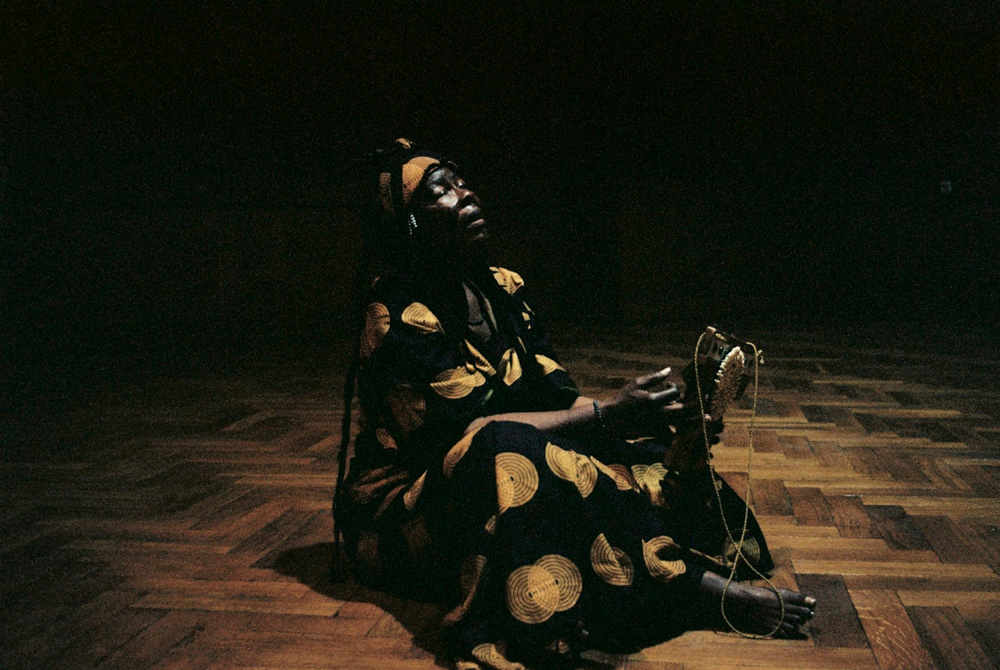33 1/3 years after the first release of the groundbreaking album Ambuya? by Stella Chiweshe, Piranha Records is releasing its international debut as 180g vinyl remastered from 100% analog tapes with a “John Peel Session” from 1988 as a bonus.

The revered name Ambuya? (“Grandmother”) with a question mark – becomes Ambuya! with an exclamation mark. The “Queen of Mbira” Stella Chiweshe has earned this not only with her music, but also with her attitude and self-assertion.
For more than five decades, the now 74-year-old artist, who has been living between Berlin and Harare since the early 1980s, has shared her love for the spiritual music of her home country Zimbabwe with listeners and viewers from all over the world.
She was the first female Mbira player to find an international audience and had to overcome a lot of traditional barriers, hegemonic masculinity, colonial rules and the control of white missionaries in her home country for that to be possible. Up until the 1960s, women were not allowed to play the Mbira, and in addition to that, the traditional culture of the country was suppressed under English colonial rule.
“At first you were not allowed to be seen with the Mbira in the city (that was punishable with imprisonment)”, says Stella, “but as soon as I heard it, the sound of the instrument never left me. I had to play it. I borrowed one to make my music.
During the ceremonies, I had to sit on the men’s side, which was contrary to the customs of the time.”

Also, with the album Ambuya? which was released in 1987, Stella Chiweshe tore down boundaries: she worked with the British world-indie legends 3 Mustaphas 3 and played an electric (sacrilege!) instead of a traditional acoustic Mbira. The album was her international breakthrough album.
In addition to the reissue, Stella Chiweshe is working on a project that will take her back to the hills of her homeland, an hour northeast of Harare. There she has begun construction work for the Chivanhu Center in order to preserve and deepen the traditional Mbira and Shona culture and to carry it on to future generations, be it nationally or beyond Zimbabwe’s borders. A crowdfunding campaign will take place from November 19th to help in financing a part of the infrastructure on-site.
Background.
“Ambuya” Stella Rambisai Chiweshe was born in 1946 in the village of Mujumi in Zimbabwe. Despite a lot of resistance, she learned to play the Mbira and quickly became one of the most sought-after musicians in her country.
In 1974 she recorded her first single, “Kassahwa,” which went gold and made her famous nationally. Following this success, she went on to release more than 20 singles and founded The Earthquake Band. One year after Zimbabwe gained independence in 1980, Stella joined the National Dance Company of Zimbabwe as a Mbira soloist, singer, dancer and actress, and toured the world with them from 1982 onwards. In 1983 she settled in Berlin, where she has mainly been living ever since.
John Peel Show broadcas ted first on 14th March 198810 Kachembere An Old Skinny Female Frog 11 Chapfudzapasi The famous song 12 Ndika fa When I Die 13 Vana Vako Vopera Your Children Are Perishing in addition to her music, she achieved great fame when she played the role of Ambuya Nehanda in a film adaptation of the life of the freedom fighter who was executed in 1897 by the colonial government.
She was a leading figure in the founding of the Zimbabwe Musicians Union and as director of the Mother Earth Trust, a network of women artists in Zimbabwe. In March 2020, she received the Lifetime Achievement Award at the National Merit Awards in Harare.
NMR (foto: Camille Bokhobza, Maria Svidryk)
















